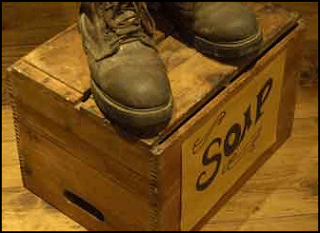
I know I said I wasn't blogging today, but I gotta get a few Obama-related things off my chest.
News just dropped that The White House had former President Clinton act as an intermediary in the Joe Sestak controversy.
Senior White House advisers asked former President Bill Clinton to talk to Joe Sestak about whether he was serious about running for Senate, and to feel out whether he'd be open to other alternatives, according to sources familiar with the situation.
According to the sources, White House chief of staff Rahm Emanuel asked Clinton and his longtime adviser, lawyer Doug Band, to talk to Sestak about the race. It's unclear right now whether the White House will say that Clinton was asked to suggest specific administration positions for Sestak, whether Clinton floated positions on his own, whether Clinton discussed other options not related to the administration, or whether employment even came up at all in the talks.
But the news that Clinton is at the center of this whole story is noteworthy on its own because of the former president's stature, and underscores how heavily invested the White House was in dissuading Sestak from running. The White House sent Clinton to talk to Sestak because Arlen Specter, constituting the 60th Dem vote in the Senate, was viewed as key to enacting Obama's agenda.
The White House maintains that Clinton's overtures to Sestak merely constituted an effort to gauge his seriousness about the race, the sources say, adding that Clinton was informally discussing the range of options open to Sestak as part of a larger conversation meant to ascertain Sestak's thinking.
Lets not be naive here: this sort of political maneuvering happens with every Administration, but more often than not, the guy asked to step aside usually doesn't have a chance of winning, and is sapping resources and time from the frontrunner. In Sestak's case, he had a legitimate chance of winning all along, so it's very fair to presume that the WH viewed him as a threat to their agenda, and thus orchestrated this end-around to try and get him to quit.
Personally, I never liked Specter, never thought he was anything other than a greasy politrician who switched parties in the name of self-preservation, and wish Obama and Co. hadn't been so quick to embrace him. With Sestak essentially pummelling him in the primary, it shows the WH should have just remained neutral and let the chips fall.
Since the position Sestak was offered seems to be unpaid, I don't think anything here is illegal, and doubt the story goes any further once the WH releases its statement on the matter. Still, this is a very bad look for Obama, who promised to end politricks as usual and usher in an era of transparency and accountability.
Speaking of which, I also gotta say that unequivocally, Obama's public actions regarding the BP oil disaster have been totally and completely lacking. Let's not get it twisted here,
he has provided the folks of the Gulf Coast the necessary federal support from day one to assist with the cleanup, and minimize the possible environmental impact on shore. Watching a guy like Bobby Jindal suggest that building man made islands would somehow magically stop a million gallons of leaking oil a day from harming Louisiana is a textbook example of populist idiocy. The Army Corps of Engineers might not be the most reliable agency for obvious reasons, but they evaluated the feasibility of the barrier plan weeks ago and decided against it. So go sit down,
Kenneth Parcell Bobby.
Reality is even if the government had stepped in sooner and taken over the efforts to stop the leak (not to be confused with cleanup efforts, which they
are in charge of), we'd still be sitting here today waiting for something to get done. If BP, a company that knows the drilling mechanisms better than anyone can't get this repaired, who in the hell thinks sending in the US military would get things done any quicker? We're more or less stuck with BP. They created the mess, they'll have to fix it, and pay for all the damage this atrocity has caused. Considering how they company cleared $40M in profits (not
net, profits!) last year, I don't think they'll have any problem picking up the massive tab for this.
The problem here, as always, is the issue of public perception. Yes, Obama sent the appropriate federal officials from day one, yes he made a quick stop there himself, and yes, I think he's honest when he says he's been paying attention to the goings on there and will hold BP accountable. But fair or unfair, people expect you to drop everything on your plate and respond with unbridled urgency when there's a disaster of
this magnitude. Multi-tasking be damned. No, Obama couldn't go down there with a roll of Bounty and sop up all the oil himself, but it would probably soothe a lot of people's nerves if he at least made the token effort. Maybe if he'd held a press conference sooner, visited more frequently, or done something to make himself more visible, his critics would have less to criticize. But perception, as anyone who looks at the effect the Tea Party has had on Obama's approval ratings knows, is ultimately reality.
President Bush rightfully gained a reputation as a guy who didn't respond well in times of crisis. Rudy Guiliani was running the nation post 9-11,
not Bush, who famously sat stunned in a classroom full of kids for minutes
after being told we were under attack. His response to Katrina was equally lax, as he went about his merry way while people drowned. The administration's "flyover" of New Orleans, and justification that it was "unsafe" on the ground only made magnified the perception that Bush just didn't give a f*ck. And when Obama finally returns to the Gulf Coast today, I can't blame folks who see echoes of Bush's "days late, dollars short" address on the ground
long after much of Katrina's initial devastation.
Sure, there are stark differences at play here. BP's disaster was entirely man made and entirely preventable, but ultimately a private sector issue, not a governmental one. Katrina was a man made disaster that was triggered by a natural disaster, that ultimately was magnified by utter and complete incompetence at the state, local, and federal government level. But the net result is the same: two Presidents, both of whom arguably didn't handle things as well as they could of, despite all of the factors that were beyond their control.
I don't like the "Obama's Katrina analogy" any more than you guys do, but it's hard for me to argue that he's handled this as well as he could have. Smart men learn from the mistakes of their predecessors and don't repeat them.
Obama's not lookin' so wise right now.
Question: Is the BP spill becoming Obama's Katrina? What (if anything) could he have done differently? Is perception reality? What's your read on the Sestak issue?




























